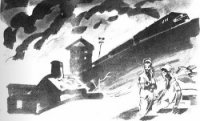Watership Down - Adams Richard George (читать книги бесплатно полностью без регистрации TXT) 📗

Жалоба
Напишите нам, и мы в срочном порядке примем меры.
Watership Down - Adams Richard George (читать книги бесплатно полностью без регистрации TXT) 📗 краткое содержание
The timeless classic novel of exile, courage and survival.
Richard Adams is the author of many bestselling novels, including Watership Down (1974), Shardik (1976), The Plague Dogs (1978), The Girl in a Swing (1980), Maia (1985), and Traveller (1988), as well as several works of nonfiction, including his autobiographical The Day Gone By (1991). He and his wife live in the south of England.
Watership Down читать онлайн бесплатно
Richard Adams
Watership Down
To Juliet and Rosamond,
remembering the road to Stratford-on-Avon
Nuthanger Farm is a real place, like all the other places in the book. But Mr. and Mrs. Cane, their little girl Lucy and their farmhands are fictitious and bear no intentional resemblance to any persons known to me, living or dead.
I acknowledge with gratitude the help I have received not only from my family but also from my friends Reg Sones and Hal Summers, who read the book before publication and made valuable suggestions.
I also wish to thank warmly Mrs. Margaret Apps and Miss Miriam Hobbs, who took pains with the typing and helped me very much.
I am indebted, for a knowledge of rabbits and their ways, to Mr. R. M. Lockley's remarkable book, The Private Life of the Rabbit. Anyone who wishes to know more about the migrations of yearlings, about pressing chin glands, chewing pellets, the effects of over-crowding in warrens, the phenomenon of re-absorption of fertilized embryos, the capacity of buck rabbits to fight stoats, or any other features of Lapine life, should refer to that definitive work.
PART I
The Journey
1. The Notice Board
CHORUS: Why do you cry out thus, unless at some vision of horror?
CASSANDRA: The house reeks of death and dripping blood.
CHORUS: How so? 'Tis but the odor of the altar sacrifice.
CASSANDRA: The stench is like a breath from the tomb.
The primroses were over. Toward the edge of the wood, where the ground became open and sloped down to an old fence and a brambly ditch beyond, only a few fading patches of pale yellow still showed among the dog's mercury and oak-tree roots. On the other side of the fence, the upper part of the field was full of rabbit holes. In places the grass was gone altogether and everywhere there were clusters of dry droppings, through which nothing but the ragwort would grow. A hundred yards away, at the bottom of the slope, ran the brook, no more than three feet wide, half choked with kingcups, watercress and blue brooklime. The cart track crossed by a brick culvert and climbed the opposite slope to a five-barred gate in the thorn hedge. The gate led into the lane.
The May sunset was red in clouds, and there was still half an hour to twilight. The dry slope was dotted with rabbits-some nibbling at the thin grass near their holes, others pushing further down to look for dandelions or perhaps a cowslip that the rest had missed. Here and there one sat upright on an ant heap and looked about, with ears erect and nose in the wind. But a blackbird, singing undisturbed on the outskirts of the wood, showed that there was nothing alarming there, and in the other direction, along the brook, all was plain to be seen, empty and quiet. The warren was at peace.
At the top of the bank, close to the wild cherry where the blackbird sang, was a little group of holes almost hidden by brambles. In the green half-light, at the mouth of one of these holes, two rabbits were sitting together side by side. At length, the larger of the two came out, slipped along the bank under cover of the brambles and so down into the ditch and up into the field. A few moments later the other followed.
The first rabbit stopped in a sunny patch and scratched his ear with rapid movements of his hind leg. Although he was a yearling and still below full weight, he had not the harassed look of most "outskirters"-that is, the rank and file of ordinary rabbits in their first year who, lacking either aristocratic parentage or unusual size and strength, get sat on by their elders and live as best they can-often in the open-on the edge of their warren. He looked as though he knew how to take care of himself. There was a shrewd, buoyant air about him as he sat up, looked around and rubbed both front paws over his nose. As soon as he was satisfied that all was well, he laid back his ears and set to work on the grass.
His companion seemed less at ease. He was small, with wide, staring eyes and a way of raising and turning his head which suggested not so much caution as a kind of ceaseless, nervous tension. His nose moved continually, and when a bumblebee flew humming to a thistle bloom behind him, he jumped and spun round with a start that sent two nearby rabbits scurrying for holes before the nearest, a buck with black-tipped ears, recognized him and returned to feeding.
"Oh, it's only Fiver," said the black-tipped rabbit, "jumping at bluebottles again. Come on, Buckthorn, what were you telling me?"
"Fiver?" said the other rabbit. "Why's he called that?"
"Five in the litter, you know: he was the last-and the smallest. You'd wonder nothing had got him by now. I always say a man couldn't see him and a fox wouldn't want him. Still, I admit he seems to be able to keep out of harm's way [1]."
The small rabbit came closer to his companion, lolloping on long hind legs.
"Let's go a bit further, Hazel," he said. "You know, there's something queer about the warren this evening, although I can't tell exactly what it is. Shall we go down to the brook?"
"All right," answered Hazel, "and you can find me a cowslip. If you can't find one, no one can."
He led the way down the slope, his shadow stretching behind him on the grass. They reached the brook and began nibbling and searching close beside the wheel ruts of the track.
It was not long before Fiver found what they were looking for. Cowslips are a delicacy among rabbits, and as a rule there are very few left by late May in the neighborhood of even a small warren. This one had not bloomed and its flat spread of leaves was almost hidden under the long grass. They were just starting on it when two larger rabbits came running across from the other side of the nearby cattle wade.
"Cowslip?" said one. "All right-just leave it to us. Come on, hurry up," he added, as Fiver hesitated. "You heard me, didn't you?"
"Fiver found it, Toadflax," said Hazel.
"And we'll eat it," replied Toadflax. "Cowslips are for Owsla [2] -don't you know that? If you don't, we can easily teach you."
Fiver had already turned away. Hazel caught him up by the culvert.
"I'm sick and tired of it," he said. "It's the same all the time. 'These are my claws, so this is my cowslip. 'These are my teeth, so this is my burrow. I'll tell you, if ever I get into the Owsla, I'll treat outskirters with a bit of decency."
"Well, you can at least expect to be in the Owsla one day," answered Fiver. "You've got some weight coming and that's more than I shall ever have."
"You don't suppose I'll leave you to look after yourself, do you?" said Hazel. "But to tell you the truth, I sometimes feel like clearing out of this warren altogether. Still, let's forget it now and try to enjoy the evening. I tell you what-shall we go across the brook? There'll be fewer rabbits and we can have a bit of peace. Unless you feel it isn't safe?" he added.
The way in which he asked suggested that he did in fact think that Fiver was likely to know better than himself, and it was clear from Fiver's reply that this was accepted between them.
"No, it's safe enough," he answered. "If I start feeling there's anything dangerous I'll tell you. But it's not exactly danger that I seem to feel about the place. It's-oh, I don't know-something oppressive, like thunder: I can't tell what; but it worries me. All the same, I'll come across with you."
1
Rabbits can count up to four. Any number above four is hrair — "a lot," or "a thousand." Thus they say U Hrair — "The Thousand"-to mean, collectively, all the enemies (or elil, as they call them) of rabbits-fox, stoat, weasel, cat, owl, man, etc. There were probably more than five rabbits in the litter when Fiver was born, but his name, Hrairoo, means "Little Thousand" — i.e., the little one of a lot or, as they say of pigs, "the runt."
2
Nearly all warrens have an Owsla, or group of strong or clever rabbits-second-year or older-surrounding the Chief Rabbit and his doe and exercising authority. Owslas vary. In one warren, the Owsla may be the band of a warlord: in another, it may consist largely of clever patrollers or garden-raiders. Sometimes a good storyteller may find a place; or a seer, or intuitive rabbit. In the Sandleford warren at this time, the Owsla was rather military in character (though, as will be seen later, not so military as some).
Watership Down отзывы
Отзывы читателей о книге Watership Down, автор: Adams Richard George. Читайте комментарии и мнения людей о произведении.
Уважаемые читатели и просто посетители нашей библиотеки! Просим Вас придерживаться определенных правил при комментировании литературных произведений.
- 1. Просьба отказаться от дискриминационных высказываний. Мы защищаем право наших читателей свободно выражать свою точку зрения. Вместе с тем мы не терпим агрессии. На сайте запрещено оставлять комментарий, который содержит унизительные высказывания или призывы к насилию по отношению к отдельным лицам или группам людей на основании их расы, этнического происхождения, вероисповедания, недееспособности, пола, возраста, статуса ветерана, касты или сексуальной ориентации.
- 2. Просьба отказаться от оскорблений, угроз и запугиваний.
- 3. Просьба отказаться от нецензурной лексики.
- 4. Просьба вести себя максимально корректно как по отношению к авторам, так и по отношению к другим читателям и их комментариям.
Надеемся на Ваше понимание и благоразумие. С уважением, администратор online-knigi.org



